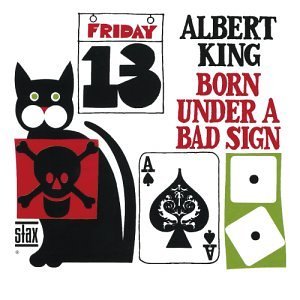Music |
Albert King: Born Under a Bad Sign
By
Published: Jun 13, 2017
Category:
Blues
One of 13 children. As a child in Arkansas, picked cotton. Grew up to be 6’4”, 250 pounds on a thin day. Known to carry a .45 in his waistband.
Think Albert King had an attitude?
You bet. And good for him. Attitude is the first qualification for a Blues musician.
Born under a bad sign
Been down since I was old enough to crawl
If it wasn’t for bad luck
I wouldn’t have no luck at all.
Lines delivered with total credibility.
But for concise elegance we look to his guitar playing.
Left-handed. Played a Gibson Flying V with a thumb rather than a pick.
And he used that thumb sparingly.
"It ain’t how many notes you play,” he said. “It’s how you play them."
Guitar players revered him. Mike Bloomfield, no slouch himself: “Albert can take four notes and write a volume. He can say more with fewer notes than anyone I’ve ever known."
Like this:
Unsurprisingly, King played in obscurity for much of his career. He worked construction. Saturday nights he was onstage in a dive.
I can’t read, haven’t learned how to write
My whole life has been one big fight
Born under a bad sign
When he signed with Stax/Volt, everything changed. His new label craved hits, not albums — the goal was 3-minute songs with hooks. King obliged, and that is how, in 1967, Stax released one of the greatest Blues albums ever, “Born Under A Bad Sign.” (To buy the CD from Amazon, click here. For the MP3 download, click here.)
Life changed fast. Cream recorded the title song. As did Hendrix. In 1968, rock promoter Bill Graham proposed to pay King $1,600 for three nights at the Filmore in San Francisco. "I hadn’t made $1,600 for three days in my life," King would recall.
Graham booked him with Jimi Hendrix and Janis Joplin. The line was around the block; the show moved to a larger theater. The gig was extended — for three weeks — and Albert King had a new audience: white kids. A year later, he was performing with the St. Louis Symphony Orchestra, which he described as "an 87-piece blues band."
What he does sounds so simple. Play less, let every note count. It’s a code we all might consider, though few have the courage to live it — there’s nothing shiny, nothing that grabs people by the lapels, in this approach. It’s Zen master music. And how many Zen masters are there, really?
Wine and women is all I crave
A big legged woman is
gonna carry me to my grave
Born under a bad sign
In fact, a heart attack took him. He was 69. Correctly, the Memphis Horns played “When the Saints Go Marching in” at his funeral.
BONUS VIDEOS


